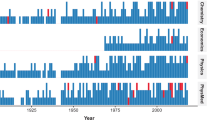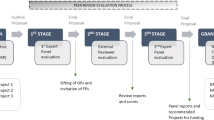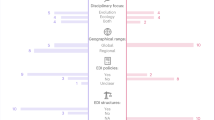Abstract
Gender disparities in the fields of science, technology, engineering and mathematics, including the geosciences, are well documented and widely discussed1,2. In the geosciences, despite receiving 40% of doctoral degrees, women hold less than 10% of full professorial positions3. A significant leak in the pipeline occurs during postdoctoral years4, so biases embedded in postdoctoral processes, such as biases in recommendation letters, may be deterrents to careers in geoscience for women. Here we present an analysis of an international data set of 1,224 recommendation letters, submitted by recommenders from 54 countries, for postdoctoral fellowships in the geosciences over the period 2007–2012. We examine the relationship between applicant gender and two outcomes of interest: letter length and letter tone. Our results reveal that female applicants are only half as likely to receive excellent letters versus good letters compared to male applicants. We also find no evidence that male and female recommenders differ in their likelihood to write stronger letters for male applicants over female applicants. Our analysis also reveals significant regional differences in letter length, with letters from the Americas being significantly longer than any other region, whereas letter tone appears to be distributed equivalently across all world regions. These results suggest that women are significantly less likely to receive excellent recommendation letters than their male counterparts at a critical juncture in their career.
This is a preview of subscription content, access via your institution
Access options
Subscribe to this journal
Receive 12 print issues and online access
$259.00 per year
only $21.58 per issue
Buy this article
- Purchase on Springer Link
- Instant access to full article PDF
Prices may be subject to local taxes which are calculated during checkout
Similar content being viewed by others
References
Valian, V. Why So Slow? The Advancement of Women (MIT Press, 1998).
Hill, C., Corbett, C. & St. Rose, A. American Association of University Women. Why So Few? Women in Science, Technology, Engineering, and Mathematics (AAUW, 2010).
Holmes, M. A., O’Connell, S. & Dutt, K. Women in the Geosciences: Practical, Positive Practices Towards Parity (AGU Special Publication Series, Wiley, 2015).
Goulden, M., Frasch, K. & Mason, M. A. Staying Competitive: Patching America’s Leaky Pipeline in the Sciences (University of California at Berkeley; Berkeley Center on Health, Economic and Family Security; and the Center for American Progress, 2009).
Postdocs at Federally Funded R&D Centers (National Science Foundation, 2015); http://www.nsf.gov/statistics/2015/nsf15312
Women, Minorities and Persons with Disabilities in Science and Engineering (National Science Foundation, 2015); http://www.nsf.gov/statistics/2015/nsf15311/tables.cfm
National Academy of Sciences Beyond Bias and Barriers: Fulfilling the Potential of Women in Academic Science and Engineering (National Academies, 2007).
Moss-Racusin, C. A., Dovidio, J. F., Brescoll, V. L., Graham, M. J. & Handelsman, J. Science faculty’s subtle gender biases favor male students. Proc. Natl Acad. Sci. USA 109, 16474–16479 (2012).
Wenneras, C. & Wold, A. Nepotism and sexism in peer review. Nature 387, 341–343 (1997).
Reuben, E., Sapienza, P. & Zingales, L. How stereotypes impair women’s careers in science. Proc. Natl Acad. Sci. USA 111, 4403–4408 (2014).
Sheltzer, J. M. & Smith, J. C. Elite male faculty in the life sciences employ fewer women. Proc. Natl Acad. Sci. USA 111, 10107–10112 (2014).
Madera, J., Hebl, M. & Martin, R. Gender and letters of recommendation for academics: agentic and communal differences. J. Appl. Psychol. 94, 1591–1599 (2009).
Trix, F. & Psenka, C. Exploring the color of glass: letters of Recommendation for female and male medical faculty. Discourse Soc. 14, 191–220 (2003).
Schmader, T., Whitehead, J. & Wysocki, V. H. A linguistic comparison of letters of recommendation for male and female chemistry and biochemistry job applicants. Sex Roles 57, 509–514 (2007).
Morgan, W. B., Elder, K. B. & King, E. B. The emergence and reduction of bias in letters of recommendation. J. Appl. Psychol. 43, 2297–2306 (2013).
Leslie, S.-J., Cimpian, A., Meyer, M. & Freeland, E. Expectations of brilliance underlie gender distributions across academic disciplines. Science 347, 262–265 (2015).
Allum, J. Phase II: Final Applications and Initial Offers of Admission. Findings from the 2014 CGS International Graduate Admissions Survey (Council of Graduate Schools, 2014).
Judge, T. A. & Higgins, C. A. Affective disposition and the letter of reference. Organ. Behav. Hum. Dec. 75, 207–221 (1998).
Hofmann, D. A. & Gavin, M. B. Centering decisions in hierarchical linear models: theoretical and methodological implications for organizational science. J. Manage. 24, 623–641 (1998).
Ibarra, H. Paving an alternative route: gender differences in managerial networks. Soc. Psychol. Q. 60, 91–102 (1997).
Heilman, M. E. & Wallen, A. S. Wimpy and undeserving of respect: penalties for men’s gender-inconsistent success. J. Exp. Soc. Psychol. 64, 664–667 (2010).
Stewart, A. J., Malley, J. E. & LaVaque-Manty, D. Transforming Science and Engineering: Advancing Academic Women (Univ. Michigan Press, 2007).
Riffe, D., Lacy, S. & Fico, F. G. Analyzing Media Messages: Using Quantitative Content Analysis in Research (Lawrence Erlbaum Associates, 2005).
Lombard, M., Snyder-Duch, J. & Bracken, C. C. Content analysis in mass communication: assessment and reporting of intercoder reliability. Hum. Commun. Res. 28, 587–604 (2002).
Lombard, M., Snyder-Duch, J. & Bracken, C. C. Practical Resources for Assessing and Reporting Intercoder Reliability in Content Analysis Research Projects (2010); http://matthewlombard.com/reliability/index_print.html
Landis, J. R. & Koch, G. G. The measurement of observer agreement for categorical data. Biometrics 33, 159–174 (1977).
Acknowledgements
K.D. would like to thank S. Pfirman for the discussion and guidelines surrounding the initial stages of this study. D.L.P. would like to thank J. Boyce for assistance with statistical modelling. This paper is contribution number 8044 from Lamont-Doherty Earth Observatory of Columbia University.
Author information
Authors and Affiliations
Contributions
K.D. initiated this study; K.D. coded the letters and did a preliminary descriptive analysis; D.L.P. analysed the data; A.F.B. coded a subset of the letters; J.S.D. assisted with statistical analysis; C.J.B. served in an advisory capacity; K.D. and D.L.P. co-wrote the paper, with all authors contributing towards discussing and interpreting the results and refining the paper.
Corresponding author
Ethics declarations
Competing interests
The authors declare no competing financial interests.
Rights and permissions
About this article
Cite this article
Dutt, K., Pfaff, D., Bernstein, A. et al. Gender differences in recommendation letters for postdoctoral fellowships in geoscience. Nature Geosci 9, 805–808 (2016). https://doi.org/10.1038/ngeo2819
Received:
Accepted:
Published:
Issue Date:
DOI: https://doi.org/10.1038/ngeo2819
This article is cited by
-
Little transparency and equity in scientific awards for early- and mid-career researchers in ecology and evolution
Nature Ecology & Evolution (2023)
-
Gender and culture bias in letters of recommendation for computer science and data science masters programs
Scientific Reports (2023)
-
Gender inequality in cum laude distinctions for PhD students
Scientific Reports (2023)
-
A framework for addressing the lack of diversity in the Geosciences through evaluating the current structure of institutional efforts
GeoJournal (2022)
-
Affirmative Action Policies in Academic Job Advertisements: Do They Facilitate or Hinder Gender Discrimination in Hiring Processes for Professorships?
Sex Roles (2022)



